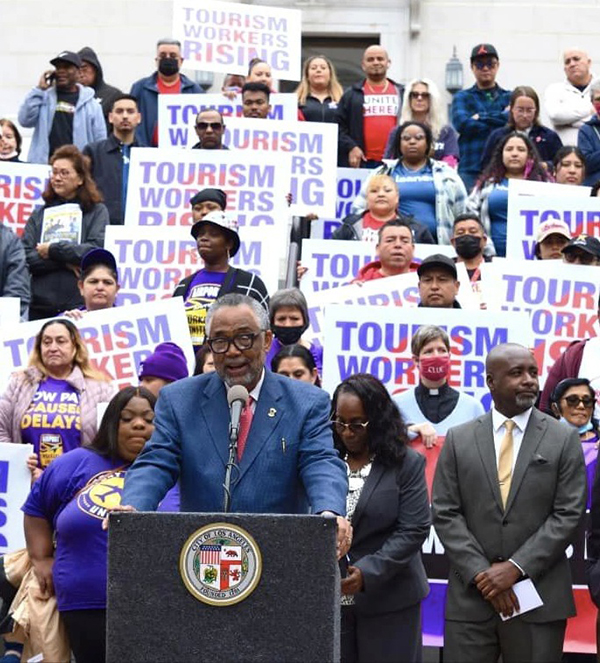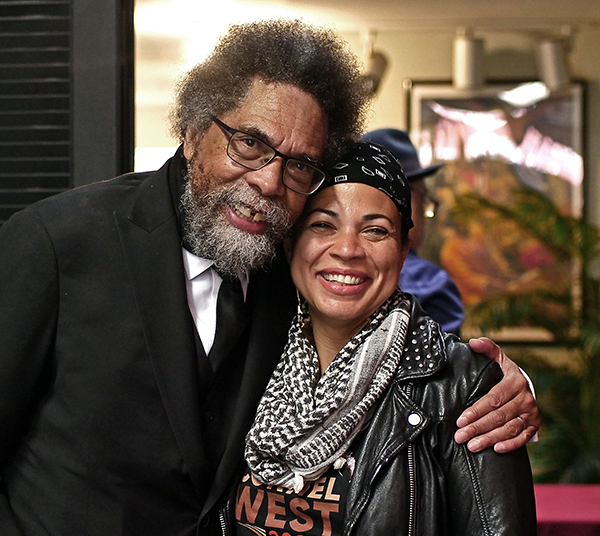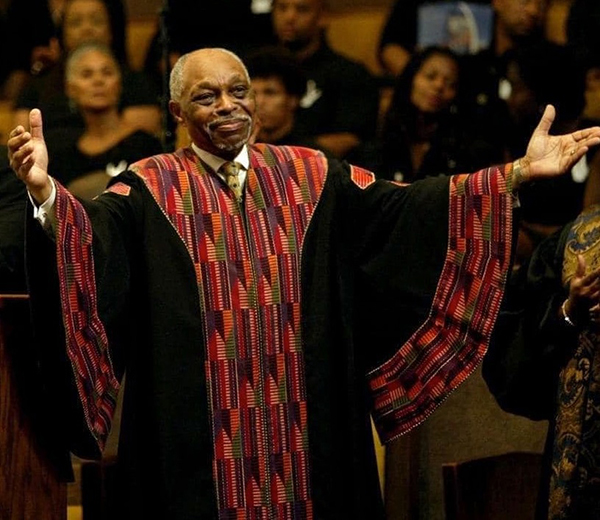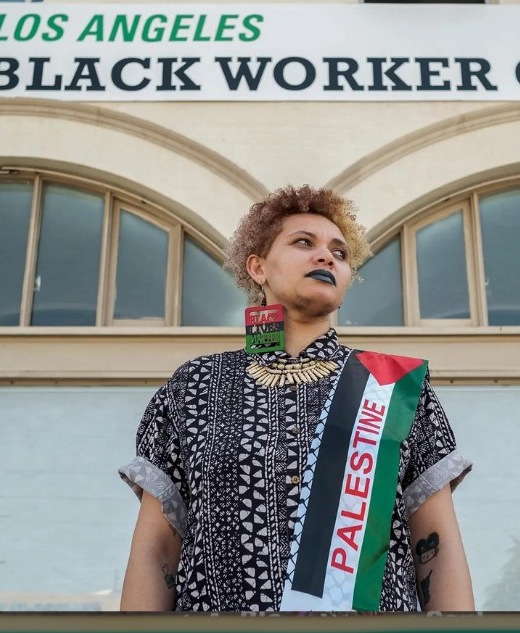Wave Wire Services
LOS ANGELES — A motion introduced April 12 by City Councilman Current Price that seeks to raise wages to $25 an hour for tourism workers was met with support from more than 100 workers who helped fill the Council Chambers to capacity, while business leaders said it would place burdens on the industry and hurt “mom and pop” and minority-owned businesses.
Price and the SEIU United Service Workers West and Unite Here Local 11, the unions representing hotel and airport workers, want wages to be commensurate with a “world-class” tourism economy and city, he said. The proposed ordinance, seconded by Councilman Hugo Soto-Martinez, would also fix what Price called loopholes in current policies to make sure workers have adequate access to health care and housing.
“Los Angeles is assuring future growth for the industry as it gears up to host global events like the 2026 World Cup and the 2028 Olympics,” Price said in a statement. “Meanwhile, wages aren’t enough to keep tourism workers housed, as Los Angeles grapples with an unprecedented housing crisis. Many of the working people who are the foundation of L.A.’s tourism economy, working in L.A. hotels and at LAX, are struggling to survive on the city’s current living wage, facing housing and food insecurity, or forced to work two jobs.”
Price said on Twitter that his proposal would benefit individuals employed at Los Angeles-area hotels with 60 or more rooms, and workers in certain occupations at LAX such as janitors, airplane cabin cleaners, airline catering workers and security officers.
“Tourism brings billions of dollars to our economy, and the businesses benefiting from tourism workers’ labor can afford to provide good jobs with fair wages,” he tweeted.
Price called the living wage movement a social justice movement, and added that nearly nine of 10 tourism workers in Los Angeles are people of color.
During a news conference outside City Hall April 12, Soto-Martinez said the motion shows that there is a new City Council that values the labor movement.
“Oftentimes in the labor movement, you fight so hard, so hard to win the things that oftentimes you cannot achieve through the legislative or government process,” he said. “Somebody asked me, ‘How fast is this going to pass?’
“It’s the same answer when a worker says, ‘How quickly are we’re going to win the union?’ It’s how much are you willing to fight. It’s how much are you willing to push. How much are you willing to get out in the streets to make sure that we win these laws,” Soto-Martinez said.
The unions launched the Tourism Workers Rising campaign, which aims to update living wage policy and push for quality health care and worker protections. Tourism workers also shared anecdotes of how they are struggling to make ends meet.
Trina Traylor, campaign coordinator for the Los Angeles Black Worker Center, which advocates for quality jobs for the Black community, came to support the coalition because the majority of her organization’s members are also low-wage workers.
“We need this motion to be passed,” Traylor said. “The cost of living continues to rise in Los Angeles but our wages are not. We need $25 an hour.”
The Valley Industry and Commerce Association issued a statement opposing Price’s motion, stating it would place “yet another burden on a tourism industry that has finally began to recover after years of hardship.”
“Implementing a $25 minimum wage in the next few months would not give businesses nearly enough time to plan for the sharp increase in costs they will be facing,” Stuart Waldman, president of the association, said in a statement.
He added that the motion would most heavily impact “mom and pop” and minority-owned businesses.
Several hours after Price filed the motion, industry leaders from the California Hotel and Lodging Association, the Asian American Hotel Owners Association and Hotel Association of Los Angeles issued a joint statement calling the councilman’s plan a “short-sighted, industry-specific mandate for political gain, that ignores accepted living wage polices and far less pay for teachers and city workers.”
“Why is it that city leaders push onerous financial burdens on our still fragile hospitality community, without demanding similar pay for Los Angeles teachers and city staff?” said Lynn Mohrfeld, president and chief executive officer of the California Hotel and Lodging Association. “It is proposals like these that have led to the city’s reputation as a difficult place to do business and to work. Enough is enough. L.A. leaders have to do better.”
In the statement, hotel industry leaders described the minimum wage proposal as hypocritical as many city workers and City Council staff members make less than $25 an hour. Just last month, the Los Angeles Unified School District agreed to a minimum wage of $22.52 an hour for its service workers, outpacing the city of Los Angeles and the state, the statement pointed out.
“We know L.A. needs a lot of support and our 500 Los Angeles hotels have always been there for the community,” said Heather Rozman, president and CEO of the Hotel Association of Los Angeles. “We ask that the City Council set aside this political expediency and help the entire tourism industry recover from the pandemic, so that Los Angeles regains its role as a global destination.”
The city’s minimum wage will increase to $16.78 per hour on July 1.
The City Council will consider Price’s motion at a future meeting.











